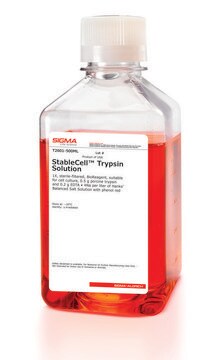T3924
Trypsin-EDTA solution
1 ×, sterile; sterile-filtered, BioReagent, suitable for cell culture, 0.5 g porcine trypsin and 0.2 g EDTA, 4Na per liter of Hanks′ Balanced Salt Solution with phenol red
Synonym(s):
Cell dissociation enzyme
About This Item
Recommended Products
biological source
Porcine
Quality Level
sterility
sterile; sterile-filtered
product line
BioReagent
form
solution
mol wt
23.4 kDa
concentration
1 ×
technique(s)
cell culture | mammalian: suitable
single cell analysis: suitable
impurities
Porcine parvovirus, none detected (9 CFR)
pH
7.0-9.0
shipped in
dry ice
storage temp.
−20°C
Looking for similar products? Visit Product Comparison Guide
Application
Suitable for use in preparation of single cell suspension for sequencing.
Biochem/physiol Actions
Serine protease inhibitors, including DFP, TLCK, APMSF, AEBSEF, and aprotinin, amongst others, will inhibit Trypsin.
Components
Caution
Preparation Note
Not finding the right product?
Try our Product Selector Tool.
also commonly purchased with this product
recommended
related product
Storage Class Code
12 - Non Combustible Liquids
WGK
WGK 1
Flash Point(F)
Not applicable
Flash Point(C)
Not applicable
Certificates of Analysis (COA)
Search for Certificates of Analysis (COA) by entering the products Lot/Batch Number. Lot and Batch Numbers can be found on a product’s label following the words ‘Lot’ or ‘Batch’.
Already Own This Product?
Find documentation for the products that you have recently purchased in the Document Library.
Customers Also Viewed
Articles
Store the cryovials in a liquid nitrogen storage tank immediately upon arrival. "/>
Technical information for working with human tracheal epithelial cells including thawing, subculturing and cryopreservation.
Technical information for working with porcine pulmonary artery endothelial cells including thawing, subculturing and cryopreservation
Protocols
Trypsin may be used to remove adherent cells from a culture surface. Cells are most commonly removed from the culture substrate by treatment with trypsin or trypsin/EDTA solutions.
Store the cryovials in a liquid nitrogen storage tank immediately upon arrival.
Technical information for working with Bovine Pulmonary Artery Endothelial Cells including thawing, subculturing and cryopreservation
Technical information for working with human bronchial epithelial cell line including thawing, subculturing and cryopreservation.
Our team of scientists has experience in all areas of research including Life Science, Material Science, Chemical Synthesis, Chromatography, Analytical and many others.
Contact Technical Service








